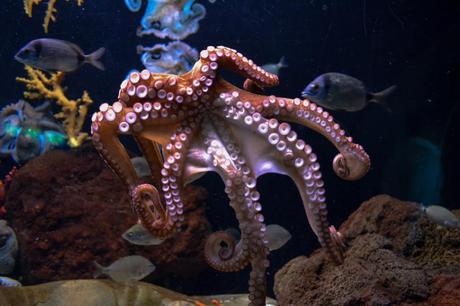Netflix is one of those companies that has shown that new models for providing both television and movies are emerging. Of course there are many subscription services, but Netflix rose to the top of the pile during this pandemic. I don’t watch it much, since my time is generally otherwise spoken for, but I did have a chance to watch My Octopus Teacher, a documentary about Craig Foster’s relationship with an octopus. The story unfolds over a year in which Foster comes to know, and to be recognized by, an octopus. Quite apart from the Cthulhu references that may come to mind, octopuses are often skittish, highly intelligent mollusks. Perhaps what made this movie such a surprise hit was just how emotionally attached viewers become to the cephalopod through Foster’s relationship with her.
 Photo by Serena Repice Lentini on Unsplash
Photo by Serena Repice Lentini on Unsplash
Almost immediately in the documentary, the viewer is struck by just how intelligent octopuses are. The particular personality—and there is no other word for it—featured in this film is able to think and solve problems. Not only that, but she is capable of forming a relationship with a human being she came to trust. For many decades we’ve been taught that animals are like automatons, reacting with stock behaviors, because they can’t think. Any claims to animal intelligence were chalked up as “anthropomorphism,” or inappropriately allowing animals to share in that coveted human trait of being “intelligent.” The idea comes from the Bible and not even scientists would question it for the longest time. Spending part of each day with one octopus, however, gives the lie to animals being subject to programmed behavior. Like both Heisenberg and Schrödinger demonstrated, being involved in the scenario necessarily changes it.
Animal intelligence has great implications for religion, of course. This is perhaps why it is such a taboo subject. What does it mean if animals can think and act intentionally? Does it imply morality? Foster implicitly raises that very question as he tries to decide whether to keep the pajama sharks away from the octopus he’s befriended. Is he watching nature or has he become a part of it? Our religions are often our ethical signposts. In more recent years ethics has been shifted to the philosophy department since many people outwardly distrust the obviously mythical aspects of religious stories. Nevertheless, the implications are clearly there. Doesn’t it make a difference that our world is filled with other intelligent beings apart from those of us with opposable thumbs? Watch My Octopus Teacher before deciding on an answer.
